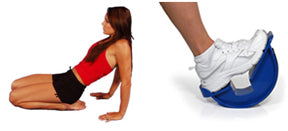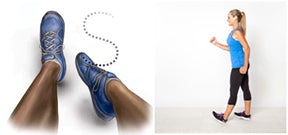FREE SHIPPING ON ORDERS OVER $25*
FREE SHIPPING ON ORDERS OVER $25*

Shin splints typically occur below the knee either on the front outside part of the leg (anterior shin splints) or the inside of the leg (medial shin splints), and almost EVERY athlete has experienced them. They usually occur in beginning runners that increase their mileage too quickly or veteran runners, who add speed work, change of terrain or too much volume to their workout routines. Basically, shin splints are always caused by TOO MUCH TOO SOON.
There can be a number of imbalances happening at once which make the cause of your shin splints hard to pinpoint, but here are a few of the main causes. Overpronation (a frequent cause of medial shin splints), inadequate stretching, old shoes or shoes that are not right for your body and foot type, excessive stress placed on one leg or one hip from running on cambered roads or always running in the same direction on a track, and the most common, doing too much too soon.
It is hard to define what a shin splint is since there is no end-all consensus among sports scientists and doctors. Most believe they are small tears in the muscle that’s pulled off the bone, an inflammation of the thin sheath of tissue that wraps around the tibia, or shin bone, an inflammation of the muscle, or some combination of these.
The most common symptom for shin splints is pain in the medial area (the inside of the shin) or anterior area (toward the outside of the leg). So while the experts can’t agree on what they are exactly, they do agree on how to treat them.
Sadly, most experts agree that you should stop running completely or decrease your training depending on the extent and duration of pain. Then during the acute phase, you need to ice your shin to reduce inflammation.
The best method of icing is freezing water in Dixie cups and doing an ice massage on the area. After you bring the inflammation down, here are some other treatments to try:
Stretch your Achilles if you have medial shin splints, and your calves if you have anterior shin splints. The best way to do this is to use the ProStretch® by Medi-Dyne®.
You can also gently stretch your shins by kneeling on a mat, legs and feet together and toes pointed directly back. Then slowly sit back onto your calves and heels. Push your ankles into the floor until you feel tension in the muscles of your shin. Hold for 10 to 12 seconds, relax and repeat 3-5 times.

In a standing position, balance on one leg and spell out the alphabet on the floor or in the air with your toes. Do this with each leg. Another great strength exercise is to alternate walking on your heels for 30 seconds with 30 seconds of regular walking. Repeat 4-5 times. These exercises are good for both recovery and prevention. Try to do them three times a day at least 3x a week.

Compression binds the tendons up against the shaft of the shin to prevent stress. So if you continue running and reduce your volume, wrap your leg before you run. You can use either tape or an Ace bandage, starting just above the ankle and continuing to just below the knee.
You can wear compression sleeves or compression socks too. Just make sure you keep wrapping your leg until the pain goes away, which usually takes three to six weeks.
Cross-Train for a while to let your shin heal. Swim, run in the pool, elliptical, strength train or ride a bike. When you return to running, increase your mileage slowly, no more than 10 percent weekly.
You need to wear the correct running shoes for your foot type. Go to your local running store and have an associate fit you. Typically, overpronators should wear motion-control shoes. Severe overpronators may need orthotics. When you find a pair or two that are comfortable and work for your feet, make sure to buy two pairs and alternate wearing them to vary the stresses on your legs.
Avoid hills and excessively hard surfaces until shin pain goes away completely, and then re-introduce them gradually to prevent a recurrence. If the roads you run on are cambered, run out and back on the same side of the road. Likewise, when running on a track, switch directions.
Luckily, shin splints can usually be dealt with quickly by looking at your training and your biomechanics. Just make sure you do more than just ice and take inflammation pills. You won’t prevent re-injury unless you find and fix the underlying cause.

Meghan is a USA Track & Field coach and a RRCA (Road Runners of America) certified distance coach. She is a certified personal trainer through the National Academy of Sports Medicine and a level 3 USA Cycling Coach. She has over 12 years of experience teaching spin classes, weight-lifting, and group exercise. Meghan is also experienced runner, ultrarunner, and triathlete competing, winning, and placing in 5Ks, 10Ks, half-marathons, marathons, ultra distances, and triathlons. She also holds multiple state Powerlifting records. Learn more about Meghan trainwithmeghan.com.
Medi-Dyne is proud to have Meghan as an Athlete Ambassador.
*Consult your doctor for proper diagnosis and rehabilitation.
The post Shin Splints: Too Much Too Soon appeared first on Medi-Dyne.


